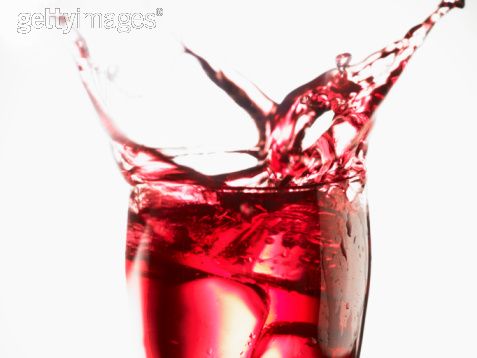
Antioxidant-rich cranberry juice may boost heart health by decreasing arterial stiffness, according to a recent Tufts and Boston University study.
Buying cranberry juice with no sugar (fruit sugars included) is not possible. Ergo, the "miracle." Double-dog dare you to prove me wrong. But let's pretend we've gotten some fresh whole cranberries from Maine's Ricker Hill Orchards and thrown them down the jaw of a juicer.
Double-strength cranberry juice containing 835 milligrams of total polyphenols (an antioxidant) and 94 mg of anthocyanins (a heart healthy flavonoid) has been shown to reduce arterial stiffness as measured by "carotid femoral pulse wave velocity," according to findings published in the American Journal of Clinical Nutrition.
It is a very good thing to have resilience in your arteries -- "stiff " arteries are like dried up pieces of old rubber tire and contribute to cardiovascular disease, stroke, dementia and avenues one would prefer to avoid on the road to heaven's (or hell's) gate.
"We did observe a highly significant effect of cranberry juice on stiffness of the central aorta, which is increasingly recognized as an important measure of vascular function with relevance to cardiovascular disease," wrote the Tufts and B.U. researchers. "... Overall, our results may provide further support for the American Heart Association recommendation that cardiovascular disease risk may be reduced by a diet rich in fruit and vegetables, including cranberries," Boston University's Joe Vita, M.D. added.
Sadly, the Boston-based scientists report no grand effects on blood pressure or cholesterol, vascular or cardiovascular function, or blood vessel relaxation. (Stay tuned for my blog on wine/alcohol.)
It was a small study and funded by cranberry giant Ocean Spray, one must note, but the National Institutes of Health (NIH) threw in cash, too.

The problem I have with bottled cranberry juices on supermarket and health food store shelves is that an 8 oz. serving on average contains 30 g of carbohydrates -- contributed entirely from sugar added in the form of other fruit juices or bad-old corn syrup. Fiber content is negligible, offering no reduction to the net carb count and resulting in the rapid rise in blood glucose readings. Poison for low-carb dieters or diabetics. Read more here.
Yet cranberry juice gallantly fights off early stage urinary tract infections (miracle number two). In 2004, France became the first country to approve a health claim for the North American cranberry species Vaccinium macrocarpon, similar to wild blueberries, for helping reduce the adhesion of certain E.coli bacteria to the urinary tract walls. Almost one-third of parents in the U.S. feed it to their kids to reduce risk of E. coli infection from hamburger.
But let's be candid, ladies -- women on vacation in warm destinations sometimes combine increased sexual activity with sitting around in wet bikini bottoms. The result? Nevermind. Let's just agree -- the best prophylactic is cranberry juice, cranberry juice, cranberry juice and water. Otherwise, your next stop is antibiotics and an abbreviated vacation.
In addition, studies suggest that proanthocyanidin-rich cranberry extracts may inhibit the growth and spread of human oesophageal adenocarcinoma (a cancer in glandular tissue) and may prevent colon cancer via an anti-inflammatory mechanism.
The Fourth Cranberry Institute Health Research Conference in Savannah, Ga. shared research into the berry's anti-aging, anti-cancer and anti-bacterial qualities. Work was cited by University of Maine assistant professor and microbiologist Vivian Chi-Hua Wu and her colleagues, who are studying ways cranberries can help protect against food-borne illnesses. Wu's studies show that cranberry concentrate slows the growth of -- or virtually eliminates -- listeria, salmonella, staph infection and E. coli in ground beef.
If you can chug lemon juice diluted with water and a sprig of mint, then you can do the same with cranberries. I happen to like it with carbonated (i.e., bad for you) water and a slice of lime on ice. Below are some juicer recipes, but beware the sugars from added fruits.
Cranberry-Apple-Orange Juice
1 cup cranberries
2 apples
1 orange, peeled
Cranberry-Pear Juice
1 cup cranberries
2 pears
Cranberry-Grape-Apple-Lemon Cocktail
Cranberry Juice for Preventing Recurring Urinary Tract Infections
1 cup cranberries
1/2 lemon, peeled
1 cup of grapes
2 apples
This is day 16 of Heart Health month. If you want to celebrate -- and are in Minneapolis -- I hear rumblings that Bobby Z, drummer in Prince's "The Revolution" band, and the American Heart Association will be getting the band and (maybe) Prince together for one night only, to celebrate Bobby Z's first-year anniversary of surviving the heart attack that almost killed him. Sunday, Feb. 19, 7 p.m. at First Avenue, the venue where Prince filmed Purple Rain.
See you tomorrow.
Images via Getty.
---
 Heart attack survivors, please click on the blue Public Service banner above and take the Yale Heart Study. If you haven't had a heart attack, click and forward to someone you love who has had a heart attack. Thank you.
Heart attack survivors, please click on the blue Public Service banner above and take the Yale Heart Study. If you haven't had a heart attack, click and forward to someone you love who has had a heart attack. Thank you.
Disclosure: Suzanne O'Malley is a Senior Research Associate for the non-profit NIH-funded Yale Heart Study, a Faculty member of the Yale Writers' Conference & Associate/Director of Yale Summer Film Institute.
For more by Suzanne O'Malley, click here.